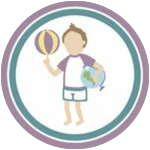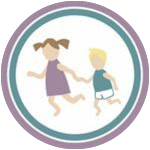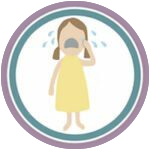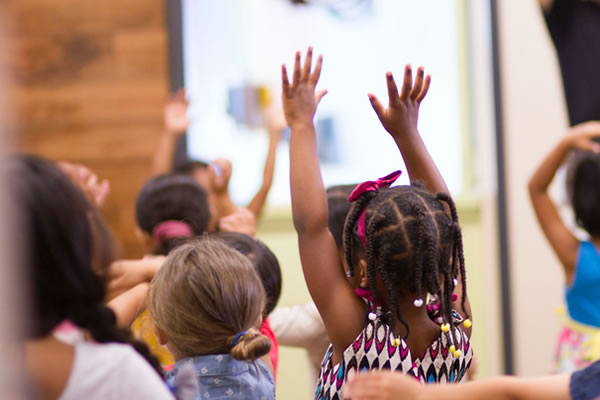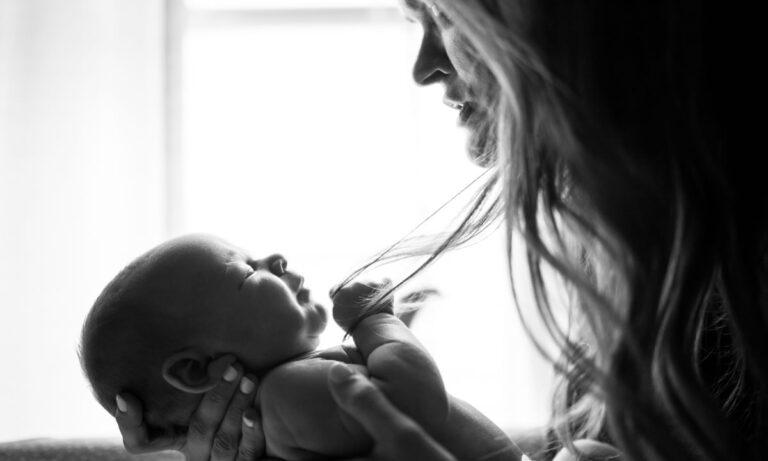When Yonatan was five, I took him and his toddler brother to a coffee shop to meet relatives he had not met before. Within minutes of our arrival, he and the two elderly ladies were engaged in a conversation. I then took my toddler and went on a couple of errands, letting the three of them have a nice visit. I returned 20 minutes later to find them discussing homeschooling.
“He makes a lot of sense,” one of the ladies said to me, “I am convinced about homeschooling, except,” she added with concern, “What about socializing?” “What about it?” I asked. Strangely, these ladies didn’t see their own interaction with the boy as socializing, nor did they notice that his younger brother was participating in the social gathering as an active listener as well.
If a child is not introduced to the concept of peers, he connects with people of all ages, learning social skills all the time.
How do Children Learn Social Skills?
It is the child’s success in relating that becomes his social competence. To ensure such success in the early years, the child needs to immerse in one-on-one, loving, and peaceful relationships with socially competent people; mostly parents and other loving caregivers. Children’s play develops later, after practicing with mommy and daddy. It becomes an important social practice once children are old enough to choose their company freely and play without the interference of adults.
Many parents believe that unless a toddler or young child plays with peers, she is not socializing and therefore not learning social skills. They often organize play groups and enter their wee-ones into daycare, preschool, or kindergarten, believing that this will help the child develop social skills.
Although I am going to debunk the benefits of such group experiences and even show the harm they can cause, I am aware that some parents have no choice but to place their child in the care of others, or in a group situation. This article in no way intends to generate feelings of guilt, nor does it judge anyone’s choices. When a child feels secure and loved, she can handle many different experiences even when they are not optimal.
Later in this article, I will offer suggestions for alternative solutions to the need for child care as well as ways to deal with group care in healing ways. My goal in this article is to shed light on the way children learn social skills so you can respond to your child’s circumstances and needs more productively and honestly, or consider a different path if needed.
By being born to adult parents, nature is designed for the child to immerse in social competence. It is wonderful for the child to join the community… from his mother or father’s loving arms or in the security of their presence.
When being part of the community while in his parent’s care, the child benefits from the parents’ social maturity in the same way the embryo benefits from his mother’s blood supply. And like pregnancy and birth, the child graduates from this need not by being pushed ahead prematurely, but by having enough time to complete the “training” and to feel confident and rooted in himself as he connects with others.
Parent-child relationships are the foundation on which the child will build his social skills; he learns the qualities of care, love, compassion, forgiveness, generosity, sharing, and deep connection. He will duplicate these qualities if we give him sufficient time to master them through his primary relationship first. He will treat his friends the way he has been treated and the way he observed his parents and others relating to each other.
When choosing his own interactions from the security of parental care, a young child gravitates towards playing with one older child, teenager, or an adult (or being with them as they engage with others.) Likewise, the older child enjoys and benefits from caring for and including a youngster.
A child will duplicate his daily social experiences. If he spends his time with those who don’t have social skills, he will learn the failing experiences that are likely to occur. You won’t see a three-year-old organizing a playgroup. She cannot do it and is not interested in being in a group with others who are as socially unskillful as she is. Instead, the very young is mostly yearning to be with mommy, daddy, an older sibling, or other loving adults who CAN interact with her skillfully.
Some wee-ones are strongly drawn to other children but usually not to groups. A child will typically reach out to one child of any age while she stays in the secure care of a parent or another loving adult. She is likely to prefer to play with one or two children who are much older than she is – because as long as she is little, she knows to seek those who can take care of her and who have social skills. Her success in relating becomes the blueprint for future relationships. The child’s innate direction tells us what is best for her.
What Wee-ones Tend to Learn at a Peer Group Setup:
Grouping children by age, or even within the span of a couple of years, is like putting the blind with the blind. It often results in some of the most undesirable children’s behaviors and can produce failing social habits. These behaviors are not natural to children but rather induced by this artificial setup.
In their desperation, wee-ones have no choice but to grab, scream, hit, or adapt to the role of a victim. Behaviors are learned as they are experienced: The hitter learns to hit, the abused learns to be a victim (and to hit) and the “teacher’s pet” learns to appease. Feeling failing and dependent, they also learn to obey authority rather than trust themselves. Such peer group experiences become part of the child’s “social skills;” these are not authentic social abilities but rather unhealthy survival strategies.
To prevent calamities and respond to the struggles created by putting socially undeveloped children together, teachers must resort to methods of control. They organize the children’s activities, patronize, coerce, reward, and punish or give much-hated “sermons.” The content of these well-intended lessons the teacher provides is not what is being learned. Instead, the children learn the controlling behaviors of the teacher which do not contribute to a good set of social skills.
Ironically, most teachers conclude that children need imposed structure, group-organized play, and externally imposed discipline. But in reality, these are only needed when children are put together in peer groups such as classrooms and other coercive setups.
Many parents report that preschool or kindergarten turned their content child into a whiny or aggressive one. Even when parents are sitting close by to their toddlers who are expected to play together, they notice that it rarely works and when it does it is for a short duration.
Older children groups and classrooms:
It is not natural to group by age. Adults group for the sake of focus on a freely chosen subject, activity, or work. When free, children too do not gather based on age, but on common interests. Even when older children are capable of playing together, the school’s imposed peer groups still produce competition, bullies and victims, social anxiety, cruelty, and dependency. How children behave in school is not an indication of their true nature.
One example out of many is the pressure to excel. A child may sit in class wishing for another to fail so she can impress the teacher with the correct answer. Instead of nurturing a sense of care for one another and of unity, this competitive and love-scarce setup creates a sense of separation and of being one against the other. Indeed, school children make their healthiest social relationships after school hours with one or two close friends. These friendships — not classroom time — propel social development.
When not previously indoctrinated by school experience and without adult intervention, children tend to play with one or two friends, or in small groups with a great range of ages. And without habits learned in the school environment, children more often get along and resolve issues much more peacefully.
Miracle Worker teachers:
Some teachers “defy gravity” and in spite of the contradictory conditions, create social and educational wonders with children, using respectful and holistic approaches. They teach social responsibility and loving connections and do their best to maximize one’s social awareness while staying connected and self-reliant. However, their success does not mean that peer groups are a viable social setup – only that these teachers are miracle workers.
Yet no matter the magic teachers create, some of the harm inherent in the setup is unavoidable, and children still learn to depend on and follow rather than to lead and create. To develop self-reliance and social competence, the child needs the opportunity to practice these skills freely.
But The Child will “Adapt” and grow to Love school or playgroup:
Some parents say that with time the child “adapts” to the school and then loves it. In some rare family circumstances, this may end up a valid choice. Most often, however, I would question the value of learning to love something that is first forced on the child.
The question to ask ourselves is: what does “adapting” mean? It means that we insist until she gives up on her inner voice; “I should ignore my feelings and follow what others tell me… others know better so I shouldn’t listen to myself.”
Succumbing to adults’ direction trains a child out of self-reliance. No wonder peer pressure is such a problem with young people; many have been trained for years to “adapt,” give up on themselves, and follow the dictates of others.
When it seems as though she “loves” it, I give credit to the child for learning to find joy in what is imposed on her. This does not mean that it is good for her. In addition, children will divert from their true selves to get our approval. Often the child is happy to please us rather than to be in school. As parents, we must constantly fine-tune our ability to sense the true emotional responses of the child and be sure her joy is about herself and not about matching expectations.
Peer groups: Who are they good for?
If grouping children of the same age is not natural or desirable, why do we form them? The answer is, for the sake of adults. It allows one adult to replace many parents, teaching many kids at once. And it allows parents to work, care for a baby, or have a much-needed break from parenting.
Mothers are often under pressure to work either for a financial need or because they believe that only earning money makes them valuable and equal to men. To convince mothers to go against their bonding instincts, we have developed a belief in the benefits of daycare or other peer experiences. Yet if we listen to children’s authentic needs, we would value parenting and prioritize parent-child connection and not substitute care.
These dogmas about grouping children have gone so deep that some stay-at-home mothers believe that group activities are somehow useful and helpful for the child. Even though they are at home, they may take their child part-time to a preschool or playgroup.
What if my child must be in daycare?
Looking for children’s optimal social development is not intended to discount the amazing power of the human spirit to grow up under many different conditions, even when not optimal. Indeed, much can be endured, especially when we speak honestly and encourage the child’s self-expression.
Therefore, if you must put your child in the care of others it is best to find ways to empower yourself and your child. If possible, I suggest you find a caring adult to be with your child so she has a relationship with one adult who immerses her in love and social competence (and takes her into the community.) If a group setting is the only option, empower her to make peace with it but don’t pretend it is best for her or what she wants (unless she authentically does.) Stay with the child each day until she is comfortable and validate her feelings without drama, so she can express and free herself of emotional conflict.
If you are lucky enough to have a group set up where a few children miraculously do get along as a group, then by all means, let them enjoy. But don’t get attached to it; it may change over time. Likewise, democratic schools provide a tribe-like “family,” for ages four to nineteen, which for a social child who has learned social skills at home, can be wonderful.
Social skills unfold naturally:
We need not teach social skills any more than we need to teach a baby to walk. Relating to socially competent people, the child acquires these skills in the process of living and loving, authentically and in her own time. Intimate and deep connections with those who love her will become the foundation for her social competence. She will form relationships and friendships that echo these childhood experiences. In being the author of her social connections she becomes self-confident, which is perhaps the greatest asset for relating and contributing to society.
©Copyright Naomi Aldort



